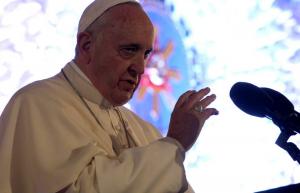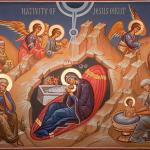
Pope Francis, in his 2019 Christmas greetings to the Roman Curia, had many words to say about the developments going on in the world and the need for the church to adapt to them. It is not just that there are many things changing around us all at once, but rather, there is one significant and overwhelming shift going in the world. The church, always inculturating itself, must adapt and deal with the shift:
All of this has particular importance for our time, because what we are experiencing is not simply an epoch of changes, but an epochal change. We find ourselves living at a time when change is no longer linear, but epochal. It entails decisions that rapidly transform our ways of living, of relating to one another, of communicating and thinking, of how different generations relate to one another and how we understand and experience faith and science. Often we approach change as if were a matter of simply putting on new clothes, but remaining exactly as we were before. I think of the enigmatic expression found in a famous Italian novel: “If we want everything to stay the same, then everything has to change” (The Leopard by Giuseppe Tomasi di Lampedusa).[1]
Things are changing, and they are changing rapidly. The church, the Pope understands, is often slow to adjust, so much so, that the church can often be said to be centuries behind the needs of the world at large. To be sure, there are good reasons for this: not all changes are good, and the church’s conservative nature can protect the church, and the truth it teaches, from the inordinate qualities associated with the changes around us today. On the other hand, this not only means the church will often fail to meet people where they are at (which is a necessary part of the church’s ministry), it will often ignore and reject wisdom and truths which the world has learned in modern times. This can cause great scandal as the church might end up emphasizing a fideism which overrides the proper union the church needs to have between faith and reason. There is, therefore, the need for the church to adapt to the times, but not in a way in which its core mission and beliefs are ignored or rejected; the church cannot and must not reject the truth wherever it is found, but rather, it must find a way to engage it, and proclaim it once it is known.
The church is a part of history and so must accept its role in time; it must mediate the transcendent truths to us, but it must do so with the recognition that not only can it can develop the way in which those truths are explained, it can slowly become more aware of the ramifications of those truth and cause itself to change to meet those ramifications. The church cannot ignore the times; it cannot fail to adapt itself to the times, even if it is not bound to the times. This is what we should learn from Pope Francis’s greetings to the curia.
The church grows; the church changes over time. This is, to be sure, quite a challenge; those who are unable to accept such changes like to promote the letter of the law from the past, but in doing so, they show they no longer have the life of Spirit within them, for the letter of the law apart from the spirit always ends up in death. That which is alive changes, that which is dead does not, but the change which is found in life is not some random, disconnected change, but one of constant development, so that within the continuum of life, it is possible to recognize and respect that growth as having an internal consistency which connects all that is found in that development as one.
This can be found in the way the church has developed its understanding and appreciation for life. There is a consistency in its teachings throughout time. At the core, it is the belief that life is good, for it is a gift given by God. Thus, in Evangelium Vitae, St. John Paul II expressed this core teaching when he wrote, “Life is always a good. This is an instinctive perception and a fact of experience, and man is called to grasp the profound reason why this is so. “[2] The history of the church shows it has always believed this and taught it, but it has not always understood the implications of this teaching, and so has not always lived it out with the authenticity it should.
In the church’s earliest times, Christians worked together to change the world, making it better as they promoted social justice and spoke out against the various indignities they saw around them, from the poor being mistreated, to the militant nature of the Roman empire, to the indiscriminate way people were put to death. But, as Christians slowly found themselves in positions of power, the full ramifications of the dignity of life were ignored. Christians found ways to justify themselves as they ignored the profound dictates of Christ in regards the dignity of life.
In modern times, social justice helped reawaken the church to the needs of the people, and in doing so, rediscover its promotion of life. It has not been easy. It has slowly discerned what exactly the dignity of life entails. Justice must always be connected with the promotion of the common good, even as the common good must work for and promote the good of all, and at the core of this, is the good of life, the value which should never be undermined. Anytime the intrinsic good of life is ignored, or worse, cast aside, the church sees a concrete example of moral failure in the world. It’s not just about abortion. It The church has had to discern within its own teaching and practices examples of such failures, and change its ways. This why the church, over time, through its own internal examination of its teaching on life, has come to realize that the death penalty is unacceptable, for the death penalty is ultimately an affirmation of death over life.
As Pope Francis indicates, we must properly draw out the core teachings of the faith in the midst of this time of great change; among those teachings we must truly recognize the value of life, and realize it is a gift, not just to humanity, but to all who live. Life is sacred in all of its forms. The web of life on the Earth must be protected just as much as every particular life must find itself affirmed by the teachings of the church. Of course, there are different values to be seen in the various forms of life, but realizing that does not undermine the fact that life is a gift of God, and as a gift of God, it is good, and should be cherished in accordance to the quality of that goodness.
The promotion of the environment is one of many ways in which the value of life, the goodness of life, is being expressed by the church, following its core teaching but developing it in accordance to the needs of the time. The destruction of the environment, the climate change crisis which looms before us, threatens all life on Earth. For the church to continue its mission and proclamation of the good of life, the good of the environment and its needs, the good of Mother Earth, must be acknowledged, not as something contending against the faith but rather as the proper expression of that faith in deed, as a way of acknowledging the good of creation and in doing so the greater good of God. Thus, when Pope Benedict XVI talked about the goodness of nature and why it must be preserved, we can see it as being a reflection upon this core teaching:
Nature expresses a design of love and truth. It is prior to us, and it has been given to us by God as the setting for our life. Nature speaks to us of the Creator (cf. Rom 1:20) and his love for humanity. It is destined to be “recapitulated” in Christ at the end of time (cf. Eph 1:9-10; Col 1:19-20). Thus it too is a “vocation.” Nature is at our disposal not as “a heap of scattered refuse”, but as a gift of the Creator who has given it an inbuilt order, enabling man to draw from it the principles needed in order “to till it and keep it” (Gen 2:15). [3]
To truly engage the time we live in, we must discern the goodness of the creator in all things. “When we can see God reflected in all that exists, our hearts are moved to praise the Lord for all his creatures and to worship him in union with them.” [4] God the creator is to be discerned in all things, as the Creator is reflected in his creation. Nonetheless, that which has life reflects this more than that which is lifeless, for God is not just a creator, but a living God, making it that whatever has life reflects him better than that which does not. To denigrate life in any of its forms is to denigrate a quality of God himself.
But, as Pope Francis explained, the church is often behind the times in its engagement with the world. This can be seen in the way it is far behind the developments promoted by Albert Schweitzer. When one reads his writings, it is easy to suggest that within them, Albert Schweitzer prophetically spoke to the needs of our age as he tried to develop insights related to the goodness of life. He realized that respecting life is about more a sense of compassion for all living things: “The principle of not killing or harming should not be considered as something in itself but as the servant of compassion and subordinate to it. Therefore, it must come to terms with reality in practical fashion.”[5] Albert Schweitzer said that such compassion should not be shown only to humans, but to all who have life, because if we do not do so, we begin to undermine the value which is to be given to life itself:
If the domain of ethics is limited to the relations of man to man, then every effort to arrive at a fundamental ethical principle which bas an absolutely binding content is hopeless from the beginning. The absolute and the universal belong together. If there really is a fundamental principle of ethics, it must somehow refer to the relation of man to life as such in all of its manifestations.[6]
But it should also be clear, any destruction of life must be seen as not being good:
Ethics, therefore, consists in this: I feel a compulsion to extend to all the will-to-live around me with the same reverence for life that I extend to my own. The fundamental principle of morality so necessary for thought is given here. It is good to maintain life and to promote life; it is evil to destroy life and to restrict life.[7]
Nonetheless, Albert understood we must also be realistic. Necessity often makes us falter from our ethic. We kill in order to survive. But, in doing this, we must recognize what we are doing. We must not make excuses for it. We must not justify the evil of killing as if it were good. Since necessity makes us killers, in various ways, we must openly acknowledge the problem and cry out of mercy, hoping that we can change things for the better. But what is extremely important is for us not to kill when there is no necessity for it:
It does not rid him of conflicts, but it forces him to decide for himself in every case how far he can remain ethical, and how far he must yield to the necessity of destroying and harming life and suffer the ensuing guilt. A man does not make moral progress by being instructed in compromises between the ethical and the necessary, but only by hearing ever more clearly the voice of the ethical, by being ruled ever more stronger by a longing to preserve life and to promote it, and by withstanding ever more stubbornly the necessity for destroying and injuring it.[8]
Thus, Schweitzer told us what we must address; he saw it was necessary for us to accept and promote the good of all life. To him this is a part of who and what we are, that is, what makes us human: “We must never permit the voice of humanity within us to be silence. It is man’s sympathy with all creatures that first makes him truly a man.”[9]
We must come to realize our proper relationship with all that lives on the Earth if we are to realize the value of life itself. This does not mean we ignore the value of human life. The recognition of the value of human life goes hand in hand with the recognition of the value of non-human life, for they are tied together with the recognition of life and the value of life itself. “The ethic of reverence for life prompts us to keep each other alert to what troubles us and to speak and act dauntlessly together in discharging the responsibility that we feel.” [10] We come to realize the value of life when we reflect upon its goodness in humanity, but in doing so, we then should move forward and develop our recognition for the value of life itself, in whatever form it takes, for then, as we do so, we begin to appreciate even more the goodness of our life, and the value it has:
Our insistence that each human being is an image of God should not make us overlook the fact that each creature has its own purpose. None is superfluous. The entire material universe speaks of God’s love, his boundless affection for us. Soil, water, mountains: everything is, as it were, a caress of God. The history of our friendship with God is always linked to particular places which take on an intensely personal meaning; we all remember places, and revisiting those memories does us much good. Anyone who has grown up in the hills or used to sit by the spring to drink, or played outdoors in the neighbourhood square; going back to these places is a chance to recover something of their true selves.[11]
Life is good. It is to be promoted. Indeed, it is the heart of the Gospel:
The Gospel of life is at the heart of Jesus’ message. Lovingly received day after day by the Church, it is to be preached with dauntless fidelity as “good news” to the people of every age and culture.[12]
God is a God of the living, not the dead. As God is a God over all life, and not just human life, all life finds itself affirmed by God. “All life is holy to the truly ethical man – even that which from the human standpoint seems to be lower life.”[13] We, too, must come to adapt, to develop this insight further, before it is too late. We are living in a time of great change. We are, indeed, at a point of crisis in the history of humanity. We must not dull our conscience. “We must never become callous. When we experience the conflicts ever more deeply we are living in truth. The quiet conscience is an invention of the devil.”[14] Will we follow through with our mission and affirm the value of life or will we follow the Satanic message of anti-life? What will be our legacy in the future? Will we create another universal denigration of the world, perhaps destroying all life on Earth because of our hubris, or will we finally accept the core teaching on the value of life, and truly fulfill our destiny as mediators of God’s grace to the whole of creation?
[1] Pope Francis, “Christmas Greeting to the Roman Curia” (12-21-2019).
[2] St. John Paul II, Evangelium Vitae. Vatican translation. ¶34.
[3] Pope Benedict XVI, Caritas in veritate. Vatican translation. ¶48.
[4] Pope Francis, Laudato si’. Vatican translation. ¶87.
[5] Albert Schweitzer, The Animal World of Albert Schweitzer. Trans. and ed. Charles R. Joy (Boston: Beacon Press, 1950), 146.
[6] Albert Schweitzer, The Animal World of Albert Schweitzer, 162.
[7] Albert Schweitzer, The Animal World of Albert Schweitzer, 168.
[8] Albert Schweitzer, The Animal World of Albert Schweitzer, 190.
[9] Albert Schweitzer, The Animal World of Albert Schweitzer, 177.
[10] Albert Schweitzer, The Animal World of Albert Schweitzer, 191-2.
[11] Pope Francis, Laudato si’, ¶84.
[12] St. John Paul II, Evangelium Vitae, ¶1.
[13] Albert Schweitzer, The Animal World of Albert Schweitzer, 173.
[14] Albert Schweitzer, The Animal World of Albert Schweitzer, 190.
Stay in touch! Like A Little Bit of Nothing on Facebook.
If you liked what you read, please consider sharing it with your friends and family!












